- Home
- Patrick O'Brian
The Fortune of War Page 3
The Fortune of War Read online
Page 3
Wallis was an old, tried colleague, with no vices but the parsimony, meanness, and cold lechery so usual in intelligence; it was clear that he was acquainted with nearly all the essentials; it was also clear that as Stephen Maturin had very nearly perished on the outward voyage, he might quite well perish entirely homeward-bound. The sea was a treacherous element; a ship but a frail conveyance—fragilis ratis—tossed by the billows at their whim, and subject to every wind that blew. It was as well that Wallis should know.
'Listen,' he said, and Wallis leant his best ear forward, his face expressive of the most intense interest and curiosity. 'Now the beginning of it you know, the arrest of Wogan with Admiralty papers in her possession?' Wallis nodded. 'She was an agent of no great importance, but a loyal, well-plucked one, not to be bought; and naturally she did her best to let her chief know how she had left the situation—who was compromised and who was not. It so happened that she had a lover aboard, a compatriot, an ingenuous scholarly young man by the name of Herapath, who had stowed himself away to be with her. She used him to convey her information: I intercepted it, at Recife. That was my first communication. At the beginning of the voyage I had an assistant called Martin, a Channel-Islander brought up in France: he died, and it occurred to me that with his antecedents he made a very convincing secret agent. I therefore fabricated a general statement of the position, purporting to have belonged to him and dealing with our intelligence in Europe, with references to the United States and to a separate document covering the East Indies. I did not possess enough information to make an East Indian report convincing to an expert, so I did not attempt it; but I flatter myself that my analysis of the European situation, and my passing remarks about the United States, would persuade even so sceptical a man as Durand-Ruel. I need scarcely tell you, my dear Wallis, that my paper contained details of double agents, of bribes, of sources of information in the various French ministries and those of their allies—indeed, it was calculated to confound their politics, to put their best men out of action, and to ruin their mutual confidence. This document was found among the dead officer's effects; it aroused suspicion; copies were to be made for the authorities at the Cape, to be sent home. Herapath and I were the only men aboard conversant with French; my time was taken up, and the task therefore fell to Herapath, who had become my assistant. I was convinced that he would tell his mistress and that Wogan's empire over him was such that in spite of his honourable reluctance, of his scruples, a copy would pass to her and that she would send it to America from the Cape. The copy did pass, and she encoded it—I have the key to their code, by the way—but we did not touch at the Cape, since at that time we were being pursued by a Dutch vessel of superior force. I comforted myself with the reflection that she would certainly contrive to send it from Botany Bay, and that the loss of those months, though infinitely regrettable, was not disastrous, since until there was a state of open, declared war between the United States and England, we could not be quite certain that the Americans would pass the information on to their French allies, or at least to their French co-belligerents. Though indeed it was probable, even in peace-time, that the usual good offices would convey the essence if not the entirety, in an informal way. Their Mr Fox sees a great deal of Durand-Ruel. But tell me, has this war been declared?'
'Not by our latest advices. Though I cannot see how it can be long delayed, if Government pursues its present course. We are strangling their trade, as well as abducting and abusing their seamen.'
'An absurd, unnecessary, immoral, blundering course,' said Stephen angrily. 'And apart from all other considerations a war would lead to a deeply stupid dispersal of our force and efforts. Can Government really mean to give that scoundrel Bonaparte a respite, merely to recover a few alleged deserters—who, by definition, are unwilling to serve—and to gratify an old ignoble spite? It is stark staring madness. But I wander. Mrs Wogan was to send the document from Botany Bay: excellent, had she ever reached that settlement. She did not. Our ship struck upon a mountain of ice and very nearly sank: some of the people went away in boats, and to these I entrusted what I could copy of my statement, so that in the event of their reaching the Cape, Sir Joseph should have some notion of what was afoot, and take his measures accordingly. That was my second communication. At the time I had little doubt that Captain Aubrey would bring us through; but I must say that the delay was a torment to my heart. You may imagine my delight, therefore, when an American whaler put in to the island where we had taken refuge—Desolation Island, a place that I shall not attempt to describe—such birds, such seals, such lichens, Wallis! It was a Paradise to me. An American whaler, homeward-bound for Nantucket. With infinite pains I induced Herapath and Wogan to go aboard this vessel, carrying the report, and to sail away. The wear of spirit, as Herapath wavered between love and honour, you cannot easily conceive, Wallis; nor the extreme difficulty of concealing my manipulation of him from his mistress. And even then, the zeal of my captain very nearly defeated me: this whaler, clearly recognizable on the horizon, appeared early one morning before I was about, and it was only by representing to him that I should certainly hang myself from the mainyard-spritsail-gubbins or something of that sort if he did not desist that I persuaded him to resume our course for New Holland, that interesting continent. When we lost sight of her, the whaler was speeding, all sails abroad, in the general direction of America; and before now, I trust, Louisa Wogan will have presented her poisoned gift with the most perfect, and wholly convincing, conviction of good faith.'
'She has!' cried Wallis. 'She has, and its effects can already be discerned as I am sure you will see from Sir Joseph's letters. He tells me that Cavaignac has been shot; and that following up your hint he has sent tolerably easily detected presents to several members of Desmoulins's bureau by way of Prussia, for favours received; from which he confidently expects a pretty holocaust. Clearly, the good offices have been in operation. Lord, Maturin, what a coup!'
Stephen's eyes glittered. He loved France and the French idea of how life should be lived, but he hated Bonaparte's intelligence service with a consuming hatred: moreover, he had been interrogated by some of its members, and he would carry the marks to his grave. 'It was a happy chance that threw Louisa Wogan in my path,' he said, 'and I have not told you of perhaps the most important event in our intercourse. She was aware that I was a friend to liberty, but it may be that she placed a false interpretation upon the words, for just before she left she desired me, with a significant look, to call upon a friend of hers in London, Mr Pole of the Foreign Office.'
'Charles Pole—the American department?' cried Wallis, changing colour.
Stephen nodded. They exchanged a look, more significant by far than Mrs Wogan's, and Stephen stood up, quite satisfied with the effect of his words. 'May I beg you to give me Sir Joseph's other letters?' he said. 'I could wish to exult for a short while, in the privacy of my cabin.'
'Here they are,' said Wallis, passing the letters after a silent pause. 'Here they are. Your private post will be at the secretary's office. It is in the Residence, the large white house: should you like me to send a boy?'
'You are very good, but I believe I shall walk there myself,' said Stephen. 'I long to see a cassowary.'
'There is every likelihood of your seeing a whole drove, or company, of them at the Admiral's. His Dutch predecessor was a cassowary-fancier, and had them brought from Ceram. It is the large white house with the flag-poles; you cannot miss it. Lord, Maturin, what a coup!'
Stephen did not miss it, but he did miss his cassowaries; they were timid birds, and the sight of a party of seamen returning from the cricket-field had caused them to hurry away on their enormous feet and stand in the shade of the sago-palms. The sailors were nominally in charge of a stunted young gentleman from the Cumberland, but the democracy of the game was still upon them, and they called out 'What cheer, Leopard?' 'Do you want any paint?' and 'Borrow a couple of muskets off of us, and set up for a man-of-war, ha, ha, ha,' waving their
bats and laughing at their own wit with a vehemence that drowned the midshipman's shrill piping, and caused the cassowaries (though tame from the egg) to retreat further into the shade, pursing their beaks.
The cricketers were scarcely out of sight before Stephen met Captain Aubrey, coming down the steps with a parcel under his arm. 'Why, Stephen,' cried he, 'there you are! I was just thinking about you. We are ordered home instanter. They have given me Acasta. Here are your letters.'
'What is Acasta?' asked Stephen, glancing at the meagre bundle without much interest.
'A forty-gun frigate, pretty well the heaviest in the service, bar Egyptienne; and Endymion and Indefatigable, of course, with their twenty-four-pounders. And the finest sailer of the lot, on a bowline. Two points off the winds, she could give even dear old Surprise foretopgallant, at least. A true, copper-bottomed plum, Stephen; I was sure the next would be some dull ship of the line, to and fro for ever off Brest, or polishing Cape Sicié. My time with frigates is pretty well up.'
'What is to happen to the Leopard?'
'She is to be a transport, as I have been telling you ever since Port Jackson. And when the Admiral sees the state of her futtocks, I doubt he will transport anything very valuable in her: the ice gave her as cruel a wrench as ever a ship could have and still swim. No, she will end her days as a transport, and God help the man who commands her if it comes on to blow.'
'Do you mean that we are to go home at once?' cried Stephen angrily.
'As soon as La Flèche comes in for despatches. Tomorrow or perhaps the next day she comes in, lies under the cape there, backing and filling, not to lose a moment of the monsoon, just long enough for Yorke to pull ashore to pick up the Admiral's billets doux and a couple of men that are invaliding and us, and then away, trembling in every limb.'
'A notoriously fragile ship, I find: very well—it is all of a piece.'
'Quivering, I meant to say. The arrow quivering. Do you smoke it?'
'How can you speak with such levity, when with the same breath you tell me that we are to go home without a chance to look at the wealth of the Indies—the flora and fauna passed by in frigid indifference, completely unexamined? The fabled upas-tree itself unseen. Can this be really so?'
'I am afraid it is. But you did have a fine run at 'em on Desolation, you recall—stuffed seals, penguins, albatross's eggs, those birds with curious beaks—Leopard's hold is crammed with them. And you did not do so badly in New Holland neither, with your God-damned wombats and all the rest.'
'Very true, Jack: do not think me ungrateful. And to be sure, I shall be glad to get my collection home as soon as possible; the giant squid is already in an advanced state of decomposition, while the kangaroos grow fractious, for want of a proper diet. But I did long to see a cassowary.'
'I am sorry for it, indeed; but the exigencies of the service . . .' said Jack, who dreaded a fresh influx of Sumatran rhinoceroses, orang-utangs, and infant rocs. 'Stephen, I do not suppose you are much of a hand with bat and ball?'
'Why should you make any such injurious supposition? I had not my equal with the hurly, or bat as you call it, from Malin Head to Skibereen.'
'I only meant that you might be above such things; but I am very glad to hear what you tell me. The Admiral challenges us to a match, and there are precious few Leopards to make up the side.'
The Captain of the Leopard, though an early riser, did not find his surgeon at the breakfast-table: nor did he find the officer or midshipman of the watch. This was scarcely odd, since, being deep in his correspondence from home, he had for once invited neither; but Dr Maturin was his invariable companion, and he called out to learn the reason for his absence. 'Killick, there. Where's the Doctor?'
'Which he gone ashore in a bumboat before the crack of dawn,' said Killick with a lewd grin; in Killick's mind there was, only one valid reason for going ashore, apart from getting drunk. He would have ventured some facetiousness had the Captain looked his usual pink cheerful morning self rather than grey-yellow and old, as though he had passed a sleepless night.
'Oh well, never mind,' said Jack, in such a tone that Killick glanced at him with real concern: he poured himself a pint mug of coffee, spread his letters on the table, and arranged them as nearly as he could in chronological order—a difficult task, for in spite of all his pleas Sophie rarely remembered to put the date. There were accounts among the letters, and from time to time he added up a sum, whistled, and looked graver still.
Killick sidled in with a dish of kidneys, the Captain's favourite relish, and placed it silently among the papers. 'Thankee, Killick,' said Jack, absently.
The kidneys were still there, as cold as the tropical sun would ever allow them to be, when Dr Maturin came aboard in his usual elegant manner, kicking the port-lids, cursing the kind hands that propelled him up the side, and arriving breathless on deck, as though he had climbed the Monument at a run. He was deeply laden, and his despondent shipmates thought they detected a python in one of the round flat covered baskets.
There were few shipmates to help him or to examine his baggage, however; only the maimed or crippled Leopards could be spared; the rest were busy. The ship's remaining midshipmen were gathered on the larboard gangway, furiously bowling spun-yarn sailcloth-covered balls at Faster Doudle, the Leopard's wicket-keeper, who seized them as accurately as a terrier might seize a rat, and with much the same ferocious concentration, while the whole watch below and all the Marines passed sharply critical remarks. For although the Leopard might lack paint and even guns, as well as men, they were determined that she should come off creditably in the match with those sods of the Cumberland—they might even wipe the buggers' eye! There were several Kent and Hampshire men among them, nurtured on the green; and Mr Babbington, their first lieutenant, had distinguished himself by notching forty-seven runs against the Marylebone club on Broad Halfpenny Down itself. He was very active among them—the ordinary forenoon tasks had been laid aside—adjuring them 'to pitch it up, pitch it up' and 'for God's sake to keep a length'; and catching sight of Stephen, he cried, 'You have not forgot the match, Doctor?'
'Never in life,' said Stephen, waving a white, new-cut piece of wood. 'I have just cut my hurly from a noble upas-tree.'
He made his way to the carpenter's and thence to the cabin, and he was giving an account of the upas-tree—'quite exploded, of course—not the least small smell of a corpse in the neighbourhood—but an interesting sight: he conceived it to be cousin to the fig'—when he noticed his friend's face, and broke off. 'I trust you have good news from home, my dear?' he said. 'That Sophie and the children are quite well?'
'Blooming, Stephen, I thank you,' said Jack. 'That is to say, the mumps ravaged the nursery shortly after we left, and George had the red-gum at Christmas; but they are better now.'
'The mumps: very good. The earlier the better. Had we stayed longer, I should have suggested leading them all into some stricken cottage. I could wish that Government would infect every child, above all every male child, at a very early age. An orchitis that takes an ugly turn is a melancholy spectacle. And Sophie is quite well?'
'She was, by her latest letter—she sends you her love in each, as I should have said before—but it was wrote a great while ago, and how she has been standing the anxiety since then I cannot tell.'
'Had she heard of Grant's bringing the boat safe to the Cape?' Jack nodded. 'She had your letters from Brazil, so she knows that you were dissatisfied with Grant. She knows that he must represent the situation as having been desperate in order to justify himself: reasoning on the basis of these two facts, she will discount his words. She will have a total confidence in your dealing with the situation. She will, if anything, underestimate the peril.'
'You are quite right, Stephen. That is exactly what she has done, and she writes to me as though she had certain knowledge I was alive; and maybe she has, too. Never shows the least doubt of it, in any of these letters, bless her. And I hope to God that by now mine have reached her from
Port Jackson. But even if they have, there is still the anxiety of this God-damned fellow Kimber. That is what I was really talking about.'
At these words Stephen's heart sank low. The Goddamned fellow Kimber had led Jack Aubrey to believe that there was silver in the dross from the ancient lead-mines on his land; that this dross could be treated by a secret process so that it would yield the residual metals; and that if a certain amount of money were spent on the undertaking, the eventual returns would be enormous. From what little Stephen understood of metallurgy, the thing itself was not physically impossible, but both he and Sophie looked upon Kimber as an impostor, one of the many land-sharks who hung about sailors on shore. Stephen knew that on his element Jack Aubrey was immensely capable, and that in warfare he was as cunning and foresighted as Ulysses, often deceiving, rarely deceived; but he had little opinion of his friend's wisdom or even common sense by land, and he had done his best to warn him against the projector. 'You did tie him up very rigorously, however, as I recall,' he said, looking attentively at Jack's face.
'Yes,' said Jack, avoiding his eyes. 'Yes, I did follow your advice; or some of it. But the fact of the matter, Stephen—the fact of the matter is, that in the hurry of leaving, and of seeing to the horses and the new stables, I signed some papers he brought me after dinner without quite attending as much as I should have done. From the way he is carrying on—new roads, cuttings, drifts, steam-engines, buildings, even some idea of a stock company—you would think one of them was a power of attorney.'

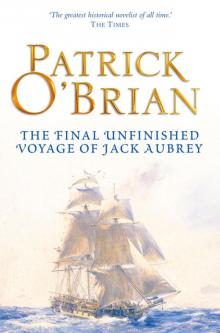 The Final Unfinished Voyage of Jack Aubrey
The Final Unfinished Voyage of Jack Aubrey The Rendezvous and Other Stories
The Rendezvous and Other Stories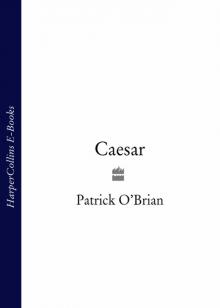 Caesar: The Life Story of a Panda-Leopard
Caesar: The Life Story of a Panda-Leopard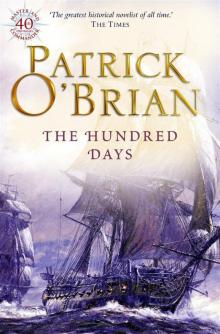 The Hundred Days
The Hundred Days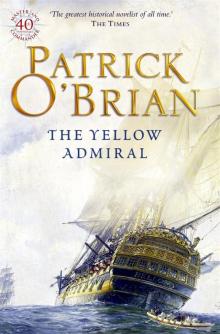 The Yellow Admiral
The Yellow Admiral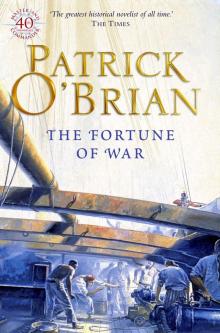 The Fortune of War
The Fortune of War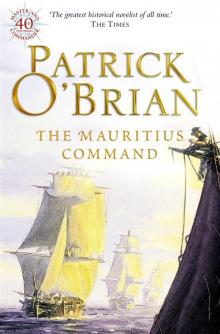 The Mauritius Command
The Mauritius Command Beasts Royal: Twelve Tales of Adventure
Beasts Royal: Twelve Tales of Adventure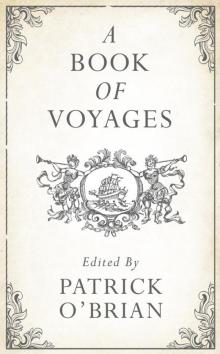 A Book of Voyages
A Book of Voyages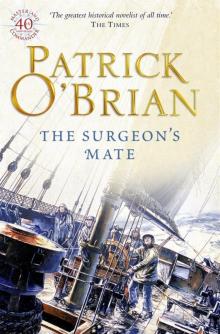 The Surgeon's Mate
The Surgeon's Mate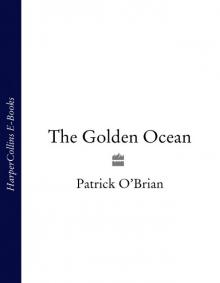 The Golden Ocean
The Golden Ocean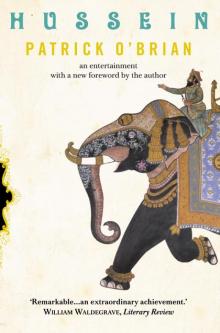 Hussein: An Entertainment
Hussein: An Entertainment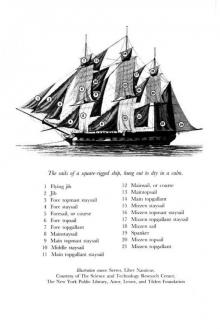 H.M.S. Surprise
H.M.S. Surprise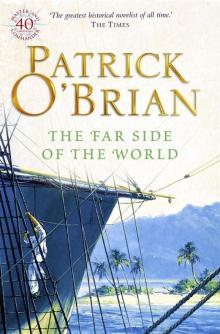 The Far Side of the World
The Far Side of the World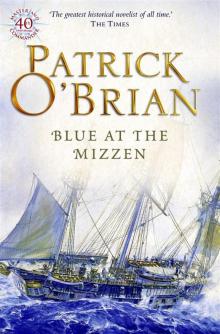 Blue at the Mizzen
Blue at the Mizzen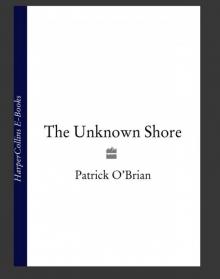 The Unknown Shore
The Unknown Shore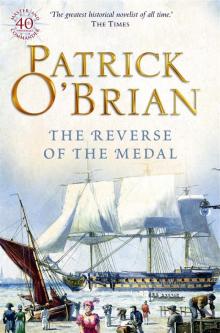 The Reverse of the Medal
The Reverse of the Medal Testimonies
Testimonies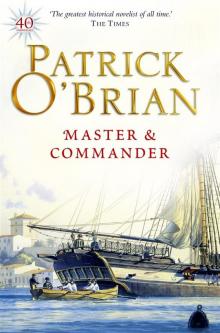 Master and Commander
Master and Commander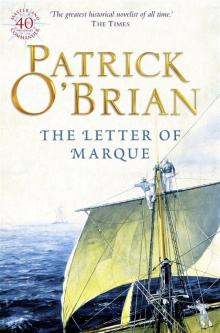 The Letter of Marque
The Letter of Marque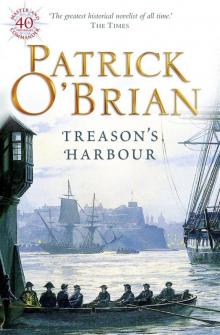 Treason's Harbour
Treason's Harbour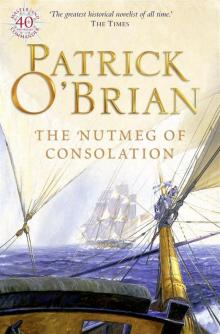 The Nutmeg of Consolation
The Nutmeg of Consolation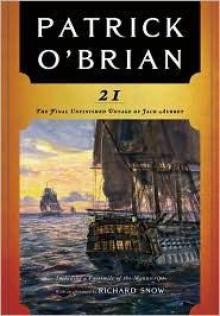 21: The Final Unfinished Voyage of Jack Aubrey
21: The Final Unfinished Voyage of Jack Aubrey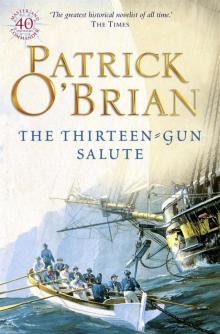 The Thirteen-Gun Salute
The Thirteen-Gun Salute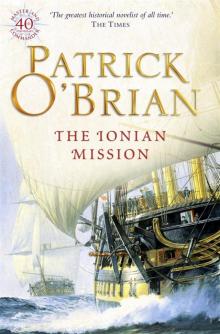 The Ionian Mission
The Ionian Mission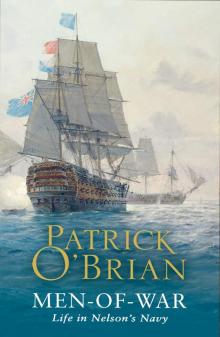 Men-of-War
Men-of-War The Commodore
The Commodore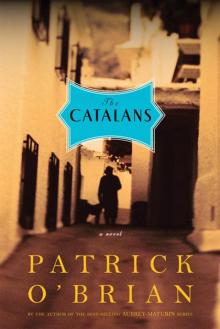 The Catalans
The Catalans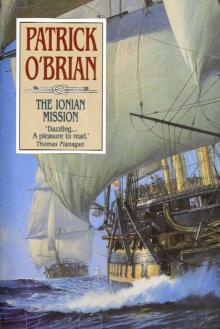 Aub-Mat 08 - The Ionian Mission
Aub-Mat 08 - The Ionian Mission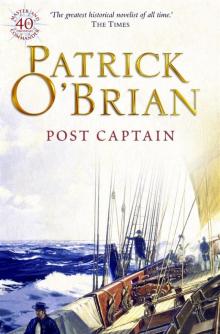 Post Captain
Post Captain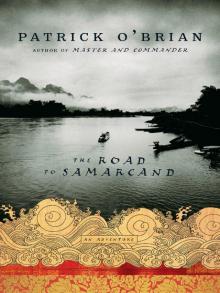 The Road to Samarcand
The Road to Samarcand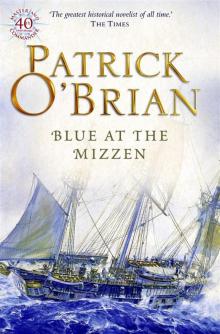 Book 20 - Blue At The Mizzen
Book 20 - Blue At The Mizzen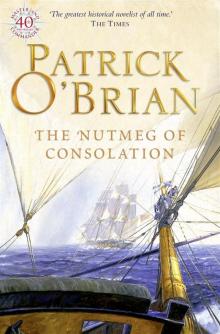 Book 14 - The Nutmeg Of Consolation
Book 14 - The Nutmeg Of Consolation Caesar
Caesar The Wine-Dark Sea
The Wine-Dark Sea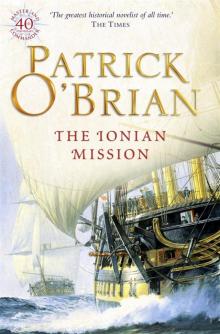 Book 8 - The Ionian Mission
Book 8 - The Ionian Mission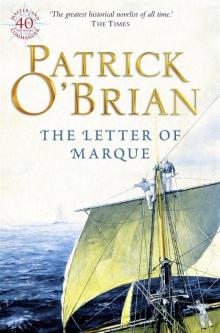 Book 12 - The Letter of Marque
Book 12 - The Letter of Marque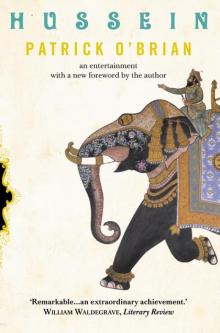 Hussein
Hussein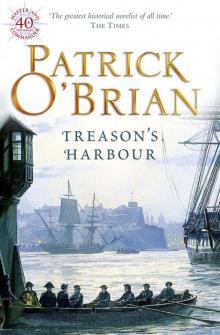 Book 9 - Treason's Harbour
Book 9 - Treason's Harbour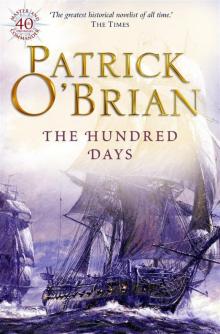 Book 19 - The Hundred Days
Book 19 - The Hundred Days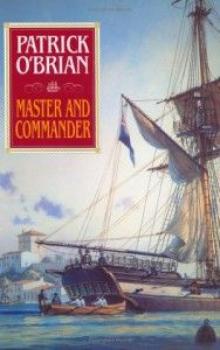 Master & Commander a-1
Master & Commander a-1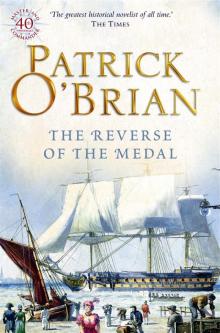 Book 11 - The Reverse Of The Medal
Book 11 - The Reverse Of The Medal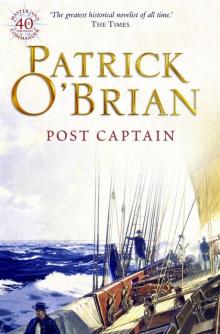 Book 2 - Post Captain
Book 2 - Post Captain The Truelove
The Truelove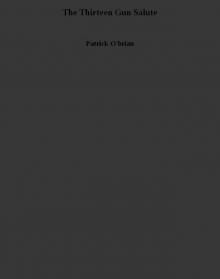 The Thirteen Gun Salute
The Thirteen Gun Salute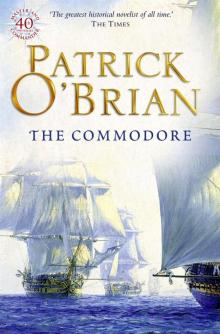 Book 17 - The Commodore
Book 17 - The Commodore The Final, Unfinished Voyage of Jack Aubrey
The Final, Unfinished Voyage of Jack Aubrey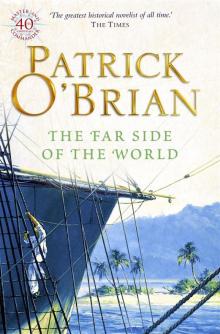 Book 10 - The Far Side Of The World
Book 10 - The Far Side Of The World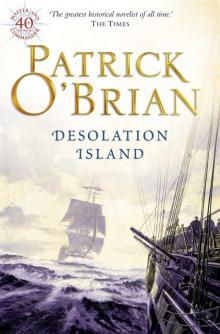 Book 5 - Desolation Island
Book 5 - Desolation Island Beasts Royal
Beasts Royal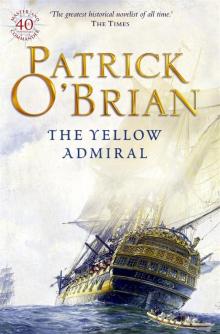 Book 18 - The Yellow Admiral
Book 18 - The Yellow Admiral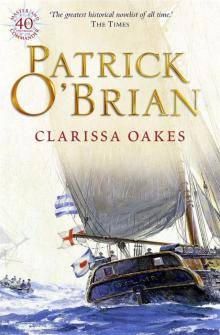 Book 15 - Clarissa Oakes
Book 15 - Clarissa Oakes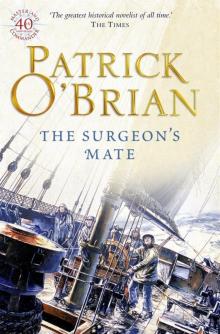 Book 7 - The Surgeon's Mate
Book 7 - The Surgeon's Mate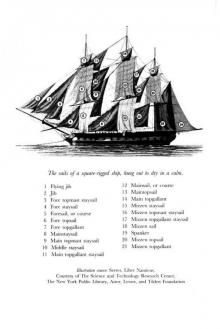 Book 3 - H.M.S. Surprise
Book 3 - H.M.S. Surprise Desolation island
Desolation island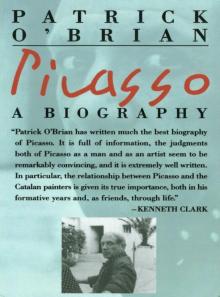 Picasso: A Biography
Picasso: A Biography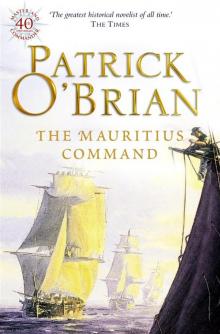 Book 4 - The Mauritius Command
Book 4 - The Mauritius Command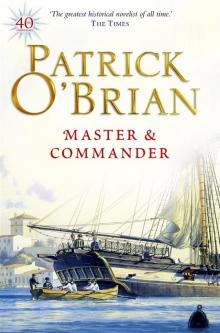 Book 1 - Master & Commander
Book 1 - Master & Commander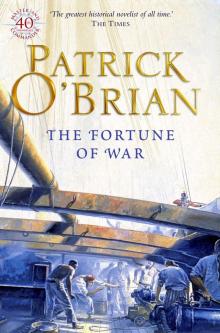 Book 6 - The Fortune Of War
Book 6 - The Fortune Of War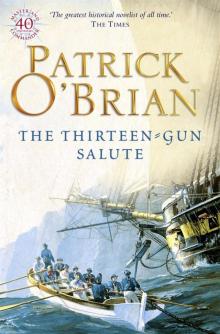 Book 13 - The Thirteen-Gun Salute
Book 13 - The Thirteen-Gun Salute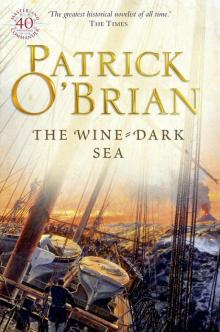 Book 16 - The Wine-Dark Sea
Book 16 - The Wine-Dark Sea